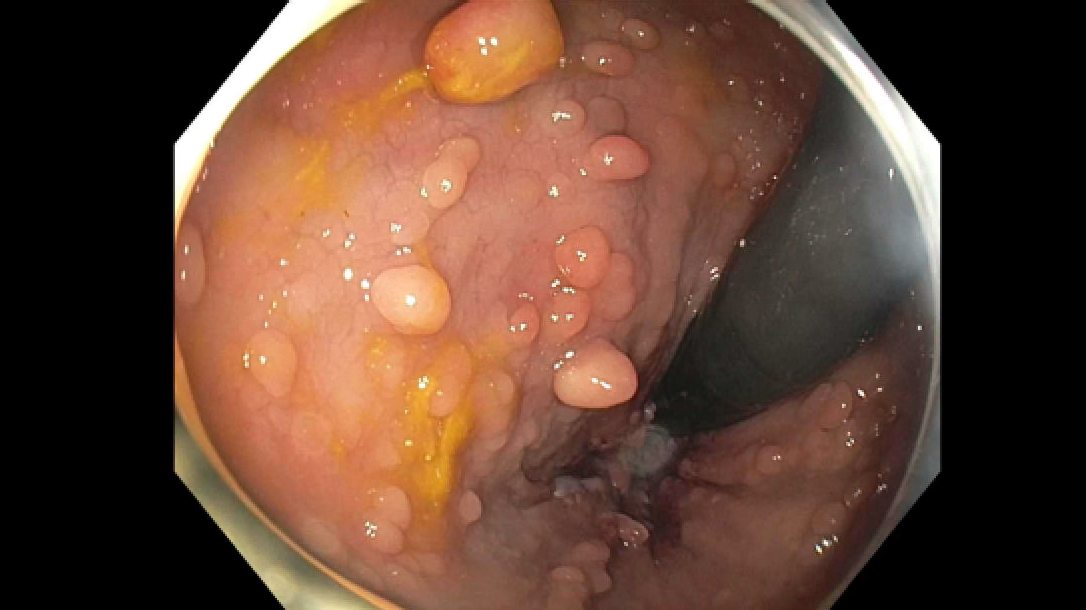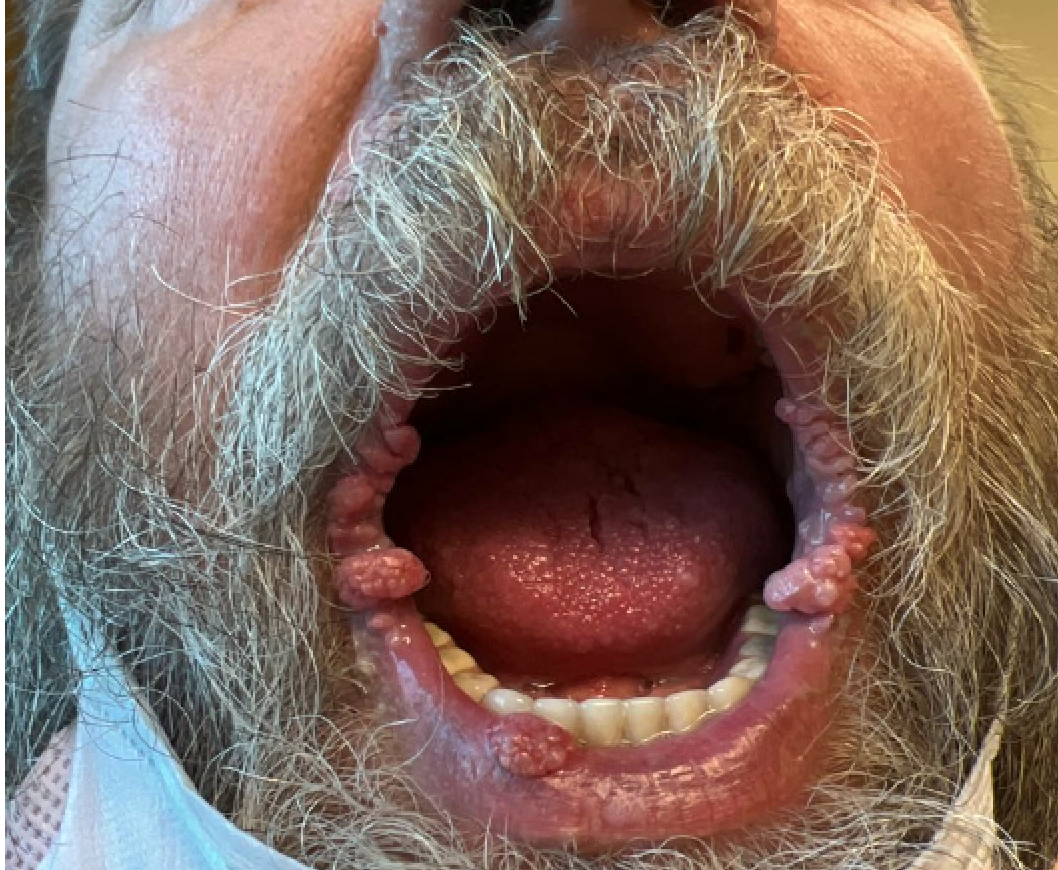Sunday Poster Session
Category: Colorectal Cancer Prevention
P0535 - When Polyps Tell a Bigger Story: Gastrointestinal Clues to Cowden Syndrome
Sunday, October 26, 2025
3:30 PM - 7:00 PM PDT
Location: Exhibit Hall
- PB
Puja Brahmbhatt, MD
Loyola University Medical Center
Maywood, IL
Presenting Author(s)
Puja Brahmbhatt, MD1, Daniel Havlichek, MD2, Dejan Micic, MD1
1Loyola University Medical Center, Maywood, IL; 2Loyola University Medical Center, Oak Park, IL
Introduction: Cowden syndrome (CS), also known as PTEN hamartoma tumor syndrome (PHTS), is a rare autosomal dominant disorder caused by mutations in the PTEN tumor suppressor gene. While classically associated with mucocutaneous lesions and increased risk of breast, thyroid, and endometrial cancers, gastrointestinal (GI) involvement is common but can be under recognized. Over 80% of patients develop GI polyps, which can be of various types including hamartomas, adenomas, leiomyomas, and inflammatory polyps. Due to its broad phenotypic variability and overlap with other polyposis syndromes, CS may evade early diagnosis.
Case Description/
Methods: A 44-year-old male was referred to the gastroenterology clinic for evaluation of intermittent melena and episodes of bright red blood per rectum. He denied abdominal pain, changes in bowel habits, or weight loss. His past medical history included a surgically resected thyroid tumor, with unavailable pathology records.
Physical exam revealed the presence of macrocephaly and longstanding papular growths on the perioral region, axilla, and buttocks (Figure 1). Initial colonoscopy revealed more than a dozen 5-15 mm sessile and pedunculated polyps throughout the colon (Figure 2). Biopsies demonstrated hamartomatous features without dysplasia.
Discussion: This case illustrates classic findings of CS including mucocutaneous lesions, macrocephaly, thyroid abnormalities, and multiple types of synchronous GI tract polyps. Diffuse glycogenic acanthosis is another common GI manifestation that was not seen in this case. National comprehensive care guidelines recommend colonoscopy starting at age 35 with surveillance intervals every five years. Other organ systems for which cancer screening is recommended include breast, endometrium, and thyroid. Especially in patients that do not meet the combination of major and minor criteria required for an operational clinical diagnosis of CS, gastroenterologists should maintain a high index of suspicion for CS in patients presenting with diffuse gastrointestinal polyposis, especially when accompanied by mucocutaneous lesions, macrocephaly, or a personal history of extraintestinal cancer to facilitate timely genetic diagnosis.

Figure: Figure 1. Mucocutaneous lesions on patient with Cowden Syndrome

Figure: Figure 2. Sessile and pedunculated polyps in rectum on colonoscopy
Disclosures:
Puja Brahmbhatt indicated no relevant financial relationships.
Daniel Havlichek indicated no relevant financial relationships.
Dejan Micic indicated no relevant financial relationships.
Puja Brahmbhatt, MD1, Daniel Havlichek, MD2, Dejan Micic, MD1. P0535 - When Polyps Tell a Bigger Story: Gastrointestinal Clues to Cowden Syndrome, ACG 2025 Annual Scientific Meeting Abstracts. Phoenix, AZ: American College of Gastroenterology.
1Loyola University Medical Center, Maywood, IL; 2Loyola University Medical Center, Oak Park, IL
Introduction: Cowden syndrome (CS), also known as PTEN hamartoma tumor syndrome (PHTS), is a rare autosomal dominant disorder caused by mutations in the PTEN tumor suppressor gene. While classically associated with mucocutaneous lesions and increased risk of breast, thyroid, and endometrial cancers, gastrointestinal (GI) involvement is common but can be under recognized. Over 80% of patients develop GI polyps, which can be of various types including hamartomas, adenomas, leiomyomas, and inflammatory polyps. Due to its broad phenotypic variability and overlap with other polyposis syndromes, CS may evade early diagnosis.
Case Description/
Methods: A 44-year-old male was referred to the gastroenterology clinic for evaluation of intermittent melena and episodes of bright red blood per rectum. He denied abdominal pain, changes in bowel habits, or weight loss. His past medical history included a surgically resected thyroid tumor, with unavailable pathology records.
Physical exam revealed the presence of macrocephaly and longstanding papular growths on the perioral region, axilla, and buttocks (Figure 1). Initial colonoscopy revealed more than a dozen 5-15 mm sessile and pedunculated polyps throughout the colon (Figure 2). Biopsies demonstrated hamartomatous features without dysplasia.
Discussion: This case illustrates classic findings of CS including mucocutaneous lesions, macrocephaly, thyroid abnormalities, and multiple types of synchronous GI tract polyps. Diffuse glycogenic acanthosis is another common GI manifestation that was not seen in this case. National comprehensive care guidelines recommend colonoscopy starting at age 35 with surveillance intervals every five years. Other organ systems for which cancer screening is recommended include breast, endometrium, and thyroid. Especially in patients that do not meet the combination of major and minor criteria required for an operational clinical diagnosis of CS, gastroenterologists should maintain a high index of suspicion for CS in patients presenting with diffuse gastrointestinal polyposis, especially when accompanied by mucocutaneous lesions, macrocephaly, or a personal history of extraintestinal cancer to facilitate timely genetic diagnosis.

Figure: Figure 1. Mucocutaneous lesions on patient with Cowden Syndrome

Figure: Figure 2. Sessile and pedunculated polyps in rectum on colonoscopy
Disclosures:
Puja Brahmbhatt indicated no relevant financial relationships.
Daniel Havlichek indicated no relevant financial relationships.
Dejan Micic indicated no relevant financial relationships.
Puja Brahmbhatt, MD1, Daniel Havlichek, MD2, Dejan Micic, MD1. P0535 - When Polyps Tell a Bigger Story: Gastrointestinal Clues to Cowden Syndrome, ACG 2025 Annual Scientific Meeting Abstracts. Phoenix, AZ: American College of Gastroenterology.
